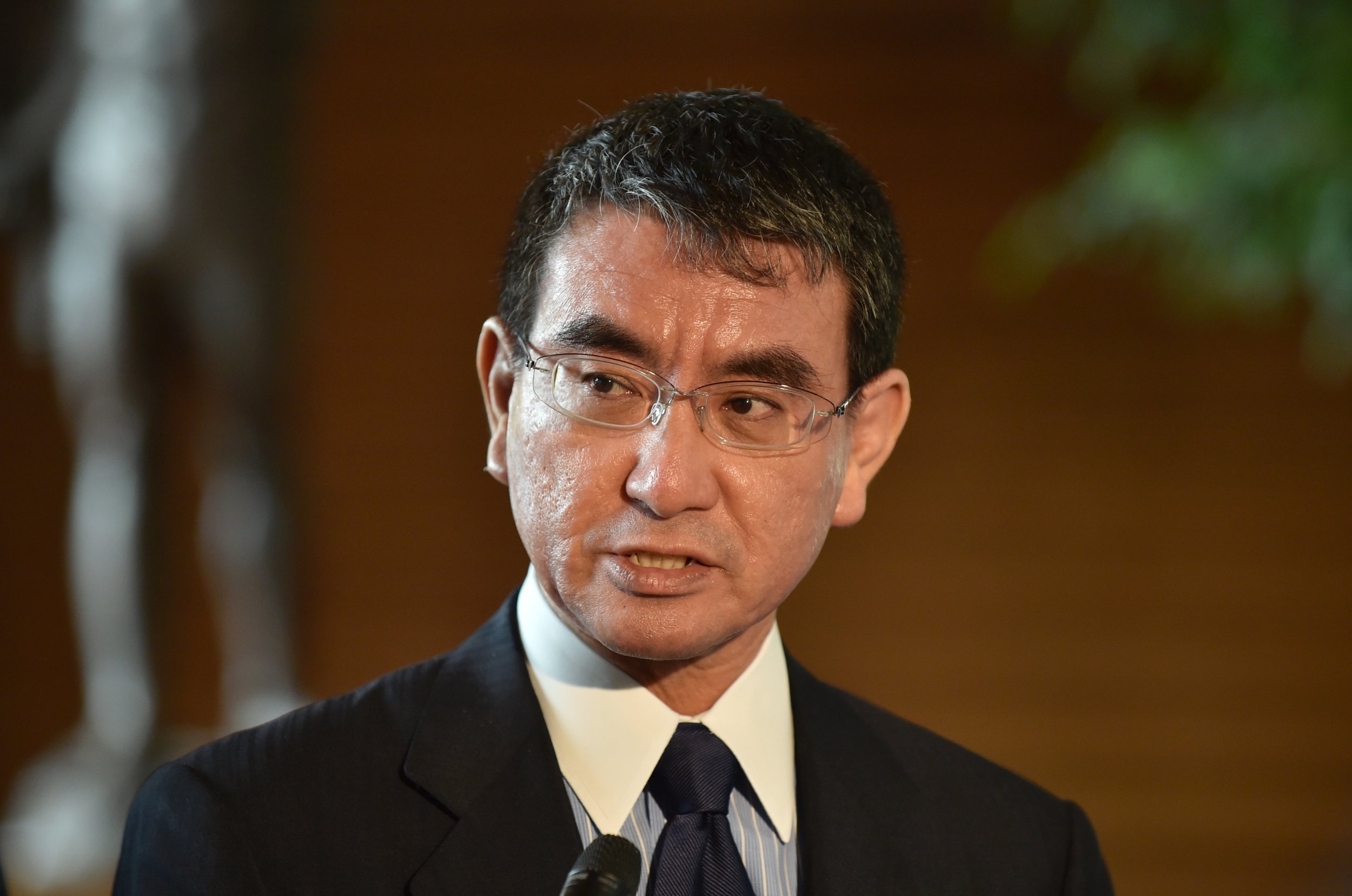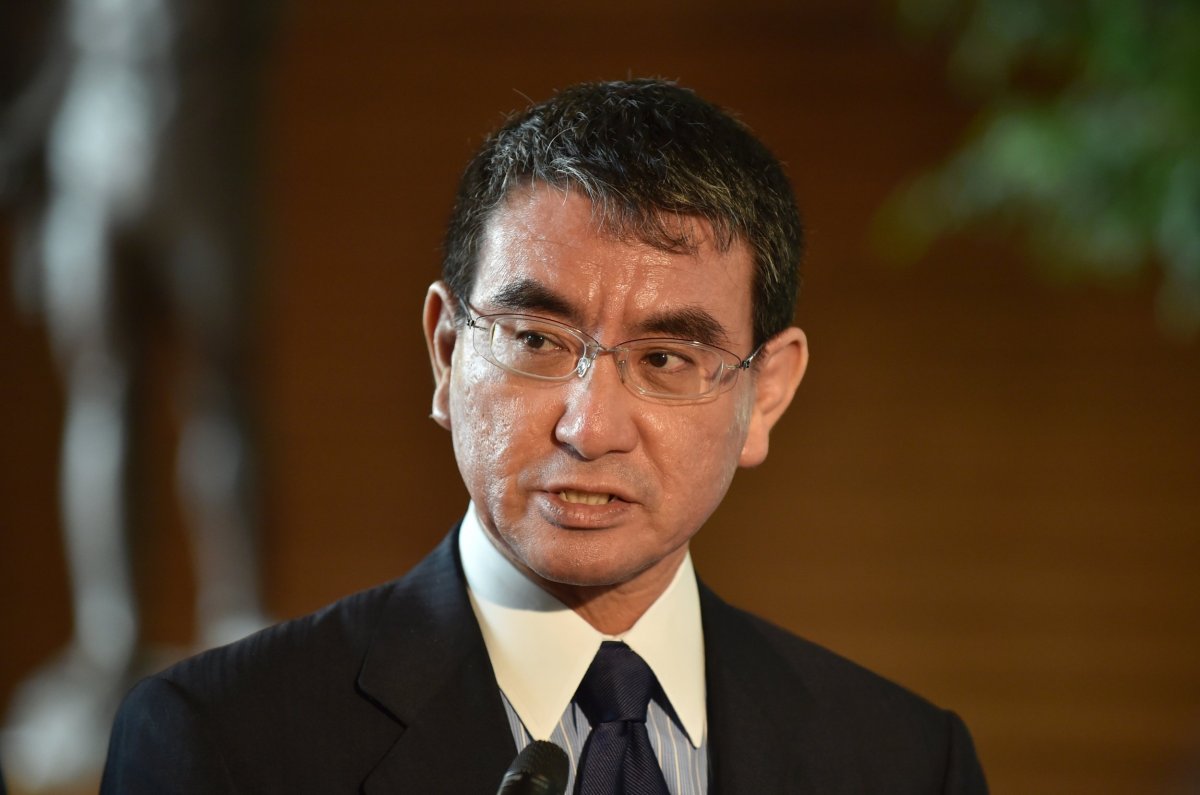
Recently appointed Japanese Foreign Minister Taro Kono announced Thursday that Tokyo would be seeking a greater role in world affairs, including a boost in its military force in response to a mounting nuclear crisis between its ally, the U.S., and longtime foe, North Korea.
Speaking at Columbia University in New York, Kono said Japan would continue to expand its international presence since "rising from the ashes of the war more than 70 years ago." Japan has kept only a modest self-defense force after being defeated by Allied, mostly U.S., forces in World War II and has largely relied on post-war security agreements with the U.S., but threats from nuclear-armed North Korea have compelled lawmakers to push for new laws giving Japan more freedom to defend itself and potentially even launch a first strike.
Related: Watch North Korea's latest ballistic missile being fired at Japan
"Japan is assuming more responsibility in the area of security and defense than ever before, Japan has increased its defense budget for five consecutive years, upgrading our defense capability, such as Japan's ballistic missile defense system, " Kono, who was appointed to his post last month, told his audience.
"Furthermore, we are prepared to do more to contribute to the stability of the world. Recent security legislations have enabled us to expand our security cooperation with the U.S. and other partners," he added, including China and Russia as potential players.

In July, North Korea conducted its first two intercontinental ballistic missile (ICBM) tests, one of which landed in waters within Japan's exclusive economic zone. The following month, the Japanese Ministry of Defense stated it would request a record $48.1 billion budget for high-tech missile defense systems, radars and fighter jets, according to The Diplomat.
About a week later, North Korea shot another missile that soared directly over Japan's northern Hokkaido region, then another last week. The sudden launches prompted panic among residents and emergency meetings among officials who have agreed that the time for talks is over."
"It is not the time for dialogue for the sake of dialogue. Now is the time for the international community as a whole to maximize the pressure on North Korea to take concrete actions toward the denuclearization of the Korean Peninsula," Kono said during Thursday's lecture.
"Japan is not and will not be a dominant military power, and, for the foreseeable future, Japan's population is shrinking and aging, unfortunately. We have no oil, gas, uranium and not much else. However, Japan should not, cannot and will not be a 'follower' in the world," he added.
For years, Japan has considered a greater focus on its military, but measures have been met with opposition by those adhering to the country's decades-long pacifist tradition established by the U.S. in 1947. On the 70th anniversary of that constitution, Japanese Prime Minister Shinzo Abe announced in May for the first time that he planned to revise it to make "explicit the status" of the country's 227,000-strong self-defense force, The New York Times reported.
Some wanted him to go further. In March, top Japanese politicians, including ruling Liberal Democratic Party head Hiroshi Imazu and former Defense Chief Gen Nakatani argued for Japan to develop a greater capacity to attack first, should it feel threatened.
Meanwhile, President Donald Trump has emboldened Tokyo by calling for more joint military drills and promising earlier this month to sell more "sophisticated military equipment" to Japan and South Korea, according to The Hill. Kono speculated that more U.S. military support for Japan and South Korea could force China to "no longer regard North Korea as an asset, but a liability."
Both modern Japan and North Korea are essentially products of World War Two, but their rivalry predates the conflict considered mankind's deadliest. In the early 20th century, Japan invaded and occupied what was then a politically unified Korean Peninsula. Alleged atrocities committed during this time period formed a basis for the current enmity held by North Korea toward Japan today.
As the war came to a fiery end with the U.S. dealing the first and last ever atomic attacks on Japan, the U.S. moved into Korea from the south and the Soviet Union moved in from the north. Both formed opposing governments that warred for three years until creating what's the current division between rival North and South Korea in 1953.
Uncommon Knowledge
Newsweek is committed to challenging conventional wisdom and finding connections in the search for common ground.
Newsweek is committed to challenging conventional wisdom and finding connections in the search for common ground.
About the writer
Based in his hometown of Staten Island, New York City, Tom O'Connor is an award-winning Senior Writer of Foreign Policy ... Read more
To read how Newsweek uses AI as a newsroom tool, Click here.








